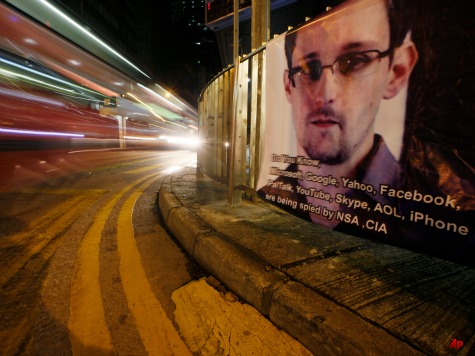With a hot stock market driving commercial demand for engineers, and Edward Snowden’s Citizen Four running in theaters, National Security Agency Director Mike Rogers spoke at Silicon Valley’s Stanford University on Monday in an effort to recruit America’s best and brightest to develop bleeding edge cybersecurity algorithms to help America spy worldwide.
United States Navy Admiral Rodgers’s predecessor at the NSA, Army General Keith B. Alexander, was humilliated last year in front of the Senate Judiciary Committee oversight hearing when he was forced to admit after Snowden’s revelations that NSA’s huge database of every phone call made in or to America had only been able to prevent one or perhaps two of the 54 plots originally claimed by the Obama administration.
But despite the grilling the NSA took in the press last year, at the peak of the Snowden revelations a Washington Post-Pew Research Center poll revealed that most Americans thought the NSA tracking of their phone records was perfectly acceptable, and stunning 45% thought the NSA’s surveillance should go further. A similar poll of younger people recently by tech savvy Survata found the NSA was more trusted with personal data than Google or Facebook.
Admiral Rodgers told a gathering of Stanford tech professors, students and privacy advocates at Stanford and a worldwide streaming on You Tube that America must depend on Silicon Valley’s innovation for technologies to stay competitive in the national security field in the digital age.
Rogers said that he comes to the “Valley” at least every six months to talk to corporate chief technology officers and academic researchers to stay aware of the latest digital initiatives. The Stanford audience members included legendary cryptographer Whitfield Diffie, who served for two and a half years as Vice President for Information Security and Cryptography at the Internet Corporation for Assigned Names and Numbers and an affiliate at the Freeman Spogli Institute’s Center for International Security and Cooperation at Stanford.
Admiral fully acknowledged that the government can never match Silicon Valley salaries. However, according to the Associated Press, he emphasized as the head of U.S. “Cyber Command that the NSA can give operators the chance to do “some neat stuff” that no one “anywhere else” can do.
That comment provoked privacy advocate and Professor Jennifer Granick, Director of Civil Liberties at the Stanford Center for Internet and Society to question how Rogers could explain the disclosures by former NSA contractor Edward Snowden that the NSA secretly broke into communications on Yahoo and Google overseas on a regular basis.
The Admiral said that his agency does not violate U.S. privacy laws in the U.S. or overseas when working with foreign intelligence agencies around the world. Rogers reportedly said with a straight face, “I’m comfortable with what we do, with our partners.”
Mark Jaycox, an Electronic Frontier Foundation legislative analyst who watched the speech webstreamed on the Internet, commented for SiliconValley.com that since Rogers was confirmed in April, he has not addressed privacy concerns raised in recent years. (In an interesting insight into EFA’s opinion of the NSA, their current website lead article is “Surveillance Self-Defense.”)
The audience at Stanford and watching on YouTube crowd had to appreciate Admiral Rodgers’s and the NSA’s candor and professionalism. But few believe the NSA has any intention of limiting its digital dragnet.
Chriss Street suggest that if you are interested in California business and politics, please click on “Box-Office Bomb: Hollywood Left’s Money Crushed by GOP Wave“

COMMENTS
Please let us know if you're having issues with commenting.